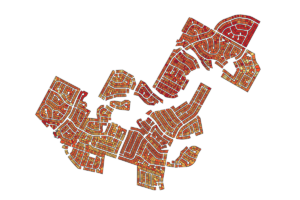In 2004, Texas author Bill Bishop in his book “The Big Sort” described the migration of Americans inspired by lifestyle choices. In envisioning a growing divide in the country, in advance of today’s political gridlock in Washington, he wrote that “we have built a country where everyone can choose the neighbors (and church and news shows) most compatible with his or her lifestyle and beliefs.
And we are living with the consequences of this segregation by way of life: pockets of like-minded citizens that have become so ideologically inbred that we don’t know, can’t understand, and can barely conceive of ‘those people’ who live just a few miles away.”
The political consequences? Increasingly we would live in separate worlds of news and what was recognized as facts, so that bipartisan dialogue and compromise would become impossible.
A decade later, it’s hard not to wonder how our politics could get more dysfunctional. Congress is unable to even pass a budget. The Senate is unwilling to consider filling a Supreme Court vacancy. And voters will soon choose between the two most unpopular major party candidates for president in polling history, candidates whose only paths to victory could come against each other.
We are soon launching an online series of short films, “Postcards from the Great Divide,” that examines aspects of our political divide in nine states. Is anyone happy in Wisconsin, where excessive gerrymandering and heightened ideological division in the Legislature has produced bitter policy fights over everything? How are African-American voters staying engaged in the face of new state restrictions to voting in Florida, a crucial swing state? What were the consequences of outside interests putting more than $1 million into a local school board race outside of Denver, Colorado?
A hint: It didn’t help produce consensus.
In our Texas film, “The Giant Still Sleeps,” the series examines the Latino vote. Or more correctly, the lack thereof. Latinos may pass whites in population next year, according to state demographers, but they made up less than 20 percent of the vote in 2014.
There’s no doubt that recent restrictive voter ID laws have had a negative impact on the Latino turnout. And without the protection of the Voting Rights Act, by action of the Supreme Court, gerrymandering and the redrawing of district lines to dilute the vote are harder to fight in the courts.
But the challenges run much deeper. There’s a cultural aversion to getting involved in politics, along with a younger population who, as of yet, doesn’t see the relevance of politics in their day-to-day lives.
Simply put, working-class voters have not been convinced it’s worth voting. Many potential voters are fearful, coming from a culture where getting politically involved was dangerous. And the lack of statewide general election competition does nothing to motivate people to go to the polls.
So why is this problem for all Texans? No matter your political preferences, the reality in our one-party state government is that we’re not debating serious differences of opinion on public policy in Texas. Party-line votes in the overwhelmingly Republican Legislature are the norm when elected officials have only primary challenges to fear for re-election. Ideological purity is the test.
In the film, former U.S. Rep. Pete Gallego, currently running to regain his South Texas seat, recalls that “in the 1980s I remember a big poster that said that the ’80s was the decade of the Hispanic. And then the ’90s were the decade of the Hispanic. And then the 2000s. So we’re still waiting for that decade.”
The rationale for a two-party system is to encourage political debate, and until our soon-to-be largest ethnic group is engaged in our democracy, nothing will change to remedy what we’re missing.
Paul Stekler is chair of the Radio-Television-Film Department in the Moody College of Communication at The University of Texas at Austin. “Postcards from the Great Divide” is viewable here.
A version of this op-ed appeared in the Houston Chronicle, McAllen Monitor, Fort Worth Star Telegram, Rio Grande Gaurdian, San Antonio Express News, Waco Tribune Herald and the Austin American Statesman.



